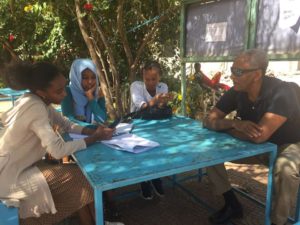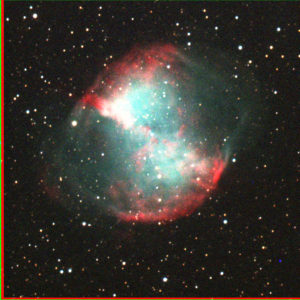EWB2019-Report
Ethiopian Educators without borders-Seminars on STEM Education and Research 2019/2020 Education Campaign (December 15-January 10 2020)

2019/2020 EEWB Sites: Debre Tabor University, Debre Birhan University, Kotebe Metropolitan University, Ethiopia-2050 Conference, Addis Ababa University of Science and Technology, Bahirdar University STEM, Center, Asela College of Teacher Training, Chilalo Terara High School, Asela Elementary School, Asela Rohbot Medical College
EEWB Team Campaigners: Dr. Abebe Kebede, Dr. Yinges Yigzaw, Dr. Joseph Beyene, Dr. Aster Tsegaye, Dr. Emanuel Birru, Dr. Mammo Muchie, Dr. Angel Ford, Dr. Daniel Alemeneh, Mrs. Aida Amare and colleagues, Mr. Girma Workie, UoG STEM Center
EEWB Solo Campaigners: Dr. Gezahegn Gorfu, Dr. Joseph Beyene, Dr. Daniel Alemneh, Dr. Angela Ford (Hawassa University, Adama University of Science and Technology, Aksum University, Jigjigga University, Woldia University, Arbaminch University)
EEWB Seminars and Workshops
Evidence-synthesis: Concepts, Methods, and Applications– Joseph Beyene, PhD McMaster University, Canada
Biostatistical and evidence synthesis methods are increasingly being used by researchers across a wide range of disciplines. Rigorous evidence synthesis methods are crucial to generate the best available evidence on a given topic and address important scientific questions. Knowledge translation, policy decisions, and implementation must be informed by properly synthesized evidence. I will discuss various systematic review and meta-analytic evidence-synthesis approaches, describe design and analysis issues, and provide illustrative applications.
Overview of process development for recombinant therapeutic proteins: Yinges Yigzaw, PhD Sr. Scientist, Genentech Inc, South San Francisco, California
The discovery of recombinant DNA technology in the 1970s lead to the emergence of genetic engineering as a new industry in biotechnology. Genetic engineering allows the cloning of desired DNA sequence into bacteria or other desirable expression systems and large-scale production of recombinant proteins. In 1982, Genentech successfully cloned and produced the first recombinant human insulin and secured FDA approval for human use. Since then the technology has evolved and enabled to manufacture much more complex therapeutic proteins such as monoclonal antibodies for the treatment of several disease indications in cancer, immunology, cardiovascular and metabolic diseases. These products are referred as biologics or biopharmaceuticals to differentiate from small molecule pharmaceuticals made through traditional chemical synthesis. Advances in bioengineering have benefited millions of patients, created thousands of jobs, and the biologics market is expected to reach ~400 billion by 2025. Before the approval of these products for human use, the process that will be sued to manufacture at large scale needs to be developed and refined through extensive studies at small and pilot scale. These include optimization of the bioreactor condition for optimum protein expression, purification steps for consistent product quality, and formulation condition for reliable protein stability. This presentation will highlight process development focus areas required for the reliable production of a recombinant therapeutic protein.
Ethiopianization/Africanization of of STEM: Abebe Kebede, PhD, NC A&T State University
The case of Astronomy Indigenous knowledge- Developing conventions for translations and transliterations Astronomy and Space Science Vocabulary Conventions (Abebe Kebede)-
Empirical Observations: The Ethiopians have a tradition of star lore s and legends. In the distant past the knowledge of astronomy and mathematics was abundant. Books such as the mysteries of heaven and earth, the book of Enoch and Abu shaker are devoted to this knowledge. There is a large body of indigenous knowledge of astronomy that people use to keep time. In this talk we will discuss possible conventions for translations and align STEM words, expressions, natural and empirical laws in indigenous languages.
STEM Education Resources: Introducing the BBC Micro Bit- Robotics for Ethiopia ( Girma Workie, University of Gondar and Abebe Kebede)-Information and communication technologies help students access learning materials that enhance their classroom learning. The most recent STEM learning tools and environments allow students to gain practical and pointed experiences for deep learning. These practical experiences engage the students in both hands activities that allow students to learn methods of measurement, plot graphs, and determine physical quantities interactively. The recently introduced BBC Micro Bit and products similar to it are widely used in STEM education. In this workshop we will review STEM and education resources and introduce the BBC Micro bit. Students will learn coding, operate autonomous robots.
Women in Science and Technology: Aster Tsegaye, PhD, Addis Ababa University
STEM Education for African Sustainable Integrated and Innovative Development Mammo Muchie, PhD South Africa
STEM is the integration of Science, Technology, Engineering, and Mathematics into a new unity of knowledge where crossing borders amongst disciplines as a resource for learning and invention is seen as very relevant and significant .Education of STEM together as an interdisciplinary field is new, but the STEM integrated knowledge resource can be enriching for learners to enable and capacitate learners to comprehend the world comprehensively and deeply. Together STEM can reinforce the integration of science as understanding; technology as modifications of reality, engineering as applied mathematics and science and mathematics as patterns and relationships. The thesis, antithesis and syntheses from the unified STEM can synergise and combine all disciplinary silos to capture the deeper understanding of reality to discover evidence anchored ways to enrich the knowledge universe rather than each one of the STEM moving along isolated trajectories that may not capture fully the real world as best as it can be.All students regardless of what they specialise should be introduced to a new STEM curriculum that should be designed and engineered in all the universities in Africa. There is a need to create a paradigm shift by making STEM education as compulsory from primary to tertiary level education. All Africans must be exposed to STEM education just like food and water, even those doing social and human sciences should be exposed and provided the opportunity. There is a need to make STEM as the African language for invention, innovation and knowledge wonder and curiosity, learning and competence building complex systems. STEM should be used for a total transformation of the African education culture by including the currently excluded past African STEM knowledge roots to rethink thinking, re- frame conceptual framing, re-learn learning to reform, transform and perform the development African integrated, sustainable and innovative landscape entirely and fully.
Hope for Special Education: Mrs. Aida Amare and Dr. Kashara Moore
Aida Amare CEO/Founder Tel: +1-310-489-2442
Fax: +1-866-530-4996
aida@hopeforspecialeducation.org www.hopeforspecialeducation.org
As recently as 2015, it has been estimated that at least one in seven Ethiopians have a disability. In Ethiopia, disability is traditionally considered to be a “curse,” so families, as well as communities, discriminate against people with disabilities. In the past, only 0.7% of
disabled people in Ethiopia have had access to education. This situation has been changing
as education for the disabled in Ethiopia is becoming more and more inclusive. However, significant barriers to education for those with disabilities remain.
Past efforts have relied on bringing in foreign educators to provide direct services to children with special needs. A new approach is needed to train local trainers and educators who come from and will remain in the communities being served.
Hope promotes an awareness campaign as we support the Special Needs Education Division in understanding students as individual learners with unique needs and learning styles. We seek to assist local communities in developing their own capacity for addressing needs related to autism and other developmental disabilities, evaluation, diagnosis, speech & language, occupational therapy, sensory integration, behavioural interventions, special education models, social skills development, and nutrition. This train-the-trainer approach builds long term sustainability for these skill sets among community residents themselves rather than building a reliance on foreign assistance. Likewise, by including local residents in the development of a special needs school, a sustainable model will be created that is replicable by many other local communities throughout Ethiopia.
University Industry Linkage, Interdisciplinary Sciences, Emanuel Birru, PhD, Addis Ababa University
University Industry Linkage is a vital issue to address the current economic and innovation problems in Africa. Industry based learning allow students to develop and improve their communications skills by interacting with other stakeholders, help them to work on various allocated targets and help them to take part in oral presentations. To acquire, integrate and apply relevant information while working on problems to arrive at suitable and innovative solutions can be best achieved in a real practice oriented team. The lecture format of learning is the passive learning approach rather problem based learning emphasizes active self-directed learning that encourage students to think in innovative way. Industry-based learning not only allows students to put theory into practice but also can enable them to comprehend real-life workplace situations. Industry based learning problems is a simulation of professional practice and allows students to focus critically on projects that require solutions to the current and future problems faced by the community. Hence, enables them to develop skills and experience valued by future employers. Additionally, it helps the Universities to build their capacities to work collaboratively with their industry partners and their local communities.
On the other hand, innovative way of solving current problems require an interdisciplinary approach. Collaborative efforts are highly required at this era to address major issues in the society such as acquiring alternative energy source, improved health, minimizing climate change effects and so on. The fourth industrial revolution makes the boundaries between different disciplines blurred. Hence, it makes it easy to different disciplines working in interdisciplinary groups. To understand the main social challenges better it requires the interdisciplinary collaboration of physical scientists, social scientists, humanities scholars, engineers, etc. Therefore, promoting interdisciplinary education in all Ethiopian universities is beneficial in terms of addressing the societal issues in a swift manner.
ESAN and Ethiopia2050–Joint Session on Workforce Development & Lecture Opportunities at Universities in Ethiopian (Abebe Kebede, Sam Kassegne)-We are happy to announce that ESAN has joined ETHIOPIA 2050 in co-organizing a joint session and discussion panel on workforce development. The session is tentatively scheduled for the morning of Day 2 of the Conference under a cross-cutting theme of “Developing Globally Competitive Workforce”. ESAN has been involved in outreach programs in Ethiopia for a very long time and they bring their years of experience in connecting Diaspora academics with Ethiopian universities.
Campus Specific Activities
Debre Tabor University Poster Session
Design of Automatic Aircraft Brake Washing Machine-SIMGNEW ESUBALEW (Mechanical Engineering) Advisor : Yonas T.(MSc. In Thermal Engineering)
Virtually every parts of the aircraft that’s manufactured or maintain and repair needs to be washed before it’s ready for use. Like other components, aircraft brake washing machine is required in the airport. The machine in use is old and is not efficient. The available aircraft washing faces challenge for washing by Slip between the basket and pulley, No heating mechanism and manually operated. Hence; it is required to design new machine that can be manufactured in the company shop. The aim of this project is to clean the aircraft brake effectively, minimize time wastage in aircraft brake washing operation, reduce wastage of human labor and keep safety on the workers by spraying hot detergent solution which not solvent in to the component, by using belt power transmission system, and by automatic brush scribing system. It can able to wash fully automatically by spraying a hot solvent solution (detergent) in to the brake. The temperature of the detergent can be controlled, by using a thermostat between 40 degrees centigrade up to 70 degrees centigrade to protect the workers from injury. This project reduces labor force since it works fully automatically as well as reduces safety hazard. This machine can be widely applied in almost all type of industries. This machine can be widely applied in almost all type of industries. The designed automatic aircraft brake washing machine have different parts, the fluid power components, mechanical components and electrical components.
Design and Implementation of IOT Based Home Automation System –Azazh Tefera , Gebrehiwot Tesifaye, Melake Awoke, Eshetu Teshale Advisor: ABEBE K. Department of computer science
This project revolves around creating a home automation system prototype with the main focus of remotely controlling home devices via internet. The system consists of a central device, a server and an Android application. IoT provides for us to use our resource in efficient and effective way by applying smartness concept on the materials that we have. Within a given home there may be number of devices that we may use for our day to day activity but it lacks easy way of accessing those home appliances especially for elderly’s and disabled people.
The main objective of this project is to develop mobile application for controlling and using home appliances by using our android mobile phone. The home appliances may be Light/bulbs, fun/AC, TV, door, fridge and other electronics materials
For Wireless controlling technique we will use Bluetooth/Wi-Fi technology. Our project is not only wait instruction form the user to control the home appliance but also the system will automatically detect the level of the light, temperature of the home, presence of fire …and so on, then the system will respond with the corresponding solution. Our project is more useful for physical disable and elderly peoples to use their home appliance easily and effectively. In general, the expected outcome of this project is to automate almost all home electronics materials for a better life using our smart mobile phone.
Design and Fabrication of Screw Conveyor for Na-CMC Mixer-Tenaw Mulugeta Meseret Muna Advisor: Adugnaw N.-Department of Mechanical Engineering
In Dejen gypsum factory, Gypsum powder and Gypsum board are produced and supplied to customers. A chemical called Na-CMC must be added to the chuck in order to improve the plasticity of the plaster.
A machine used to mix the chuck and the chemical is required to save man power and time of production.
The project involves, Design of conveyor screws, Design of transmission shaft, Selection of induction motor, Selection of bearing, Design of coupling and coupling key, Design of housing and shooter, Design of hopper as well as manufacturing of each components. Screw conveyor has been designed and the developed machine have the following components. The housing is cover part of the shaft with screw (flights) where the chemical Na –CMC are transport and they are connected to hopper for proper mixing. The machine used 0.75 Kw electric induction motor that supply a chemical to a mixing unit and also the speed of the induction motor. After design of each component is done, the fabrication is done in the factory. The fabrication involves, cutting, welding and surface finishing for proper assembly. Finally test the assembled machine. The machine screw conveyor can mix 15 kg/hr to increase efficiency and quality of chuck. And also it reduce the cost needed for worker.
IoT based weather reporting system for Guna Mountain Robel Gebrie, Habtamu Baye, Bimrew Kindie, Hareg Molla Advisor: ABEBE K. Department of Computer Science
Weather is the state of the atmosphere, to the degree that it is hot or cold, wet or dry, calm or stormy, clear or cloudy. Most weather phenomena occur in the troposphere, just below the stratosphere. Weather generally refers to day-to-day temperature and precipitation activity, whereas climate is the term for the average atmospheric conditions over longer periods of time. The proposed system is an advanced solution for weather monitoring that uses IoT to make its real time data easily accessible over a very wide range. The system deals with monitoring weather and climate changes like temperature, humidity, wind speed, moisture, light intensity The IOT based Weather Monitoring and Reporting System project is used to get Live reporting of weather conditions. It will monitor temperature, humidity, and moisture and rain level. Suppose Scientists/nature analysts want to monitor changes in a particular environment like volcano or a rain-forest. And these people are from different places in the world. In this case, SMS based weather monitoring system has some limitations. Since it sends SMS to few numbers. And time for sending SMS increases as the number of mobile numbers increases. In order to know the information about weather of a particular place then they have to visit that particular sites. Where everyone can see it.
Kotebe Metropolitan University Projects (Dr. Tewodros Mulugeta)
Development of Biology Laboratory – Call to donate or help purchase equipment
The laboratory equipment that the department has been using has aged and most of them are not working properly and it is almost impossible to repair because there are no accessories. Most of the laboratory tools are more than 50 years old they should be in a museum rather than having them in a laboratory in the dynamic world. Even though, the university is trying to buy laboratory items the limited budget is the main bottleneck and can even fulfill the consumables needed. The tools we have always end up giving false results to the experiment we do. Globalization is bringing the world into a single village, in this village one should have enough knowledge and skills in order to survive and overcome the challenges but without being equipped with the necessary education supported by practical training. In order to give quality education, we hope it is vital to have the laboratory pieces of equipment needed in place.
| Equipment | Quantity |
| Autoclave | 1 |
| Bead sterilizer | 2 |
| Cell strainer 100 μm | 1 |
| Centrifuge | 1 |
| Deep freezer/-80 | 2 |
| Deionized | 1 |
| Digital hot plate | 1 |
| E-Gel imager | 1 |
| Sensitive balance | 1 |
| ELISA kits | 1 |
| Gel electrophoresis | 2 |
| GPS | 1 |
| Growth chamber | 2 |
| Heater | 2 |
| Heating block | 1 |
| Hemocytometer | 1 |
| High-performance liquid chromatography (HPLC) | 1 |
| Hood | 1 |
| Hot plate magnetic stirrer | 3 |
| Icemaker | 1 |
| Imaging Microscope | 2 |
| Incubator | 1 |
| Laminar flow | 1 |
| Micropipette set | 1 |
| Mosquito Bio-cone | 30 |
| Nanodrop | 1 |
| Ordinary Compound Microscope | 10 |
| Oven | 2 |
| PCR tubes | 1 |
| Plastic tray | 20 |
| Shaking water bath | 1 |
| Spectrophotometer | 1 |
| Thermal cycler | 1 |
| UV transilluminator | 1 |
| Water distiller | 1 |
| Well-plates | 1 |
| WHO adult mosquito test kit | 10 |
| WHO Mosquito susceptibility test kit | 2 |
| Binoculars | 10 |
| Range finder | 5 |
| Sherman trap for rodents | 3 |
| Mist nets for birds | 2 |
| Head torches | 5 |
| Spotting scope | 2 |
| Camera traps | 2 |
| Drones | 1 |
| Caliper | 2 |
| Sweep net | 10 |
Special Needs Education Facilities Develoment Project (Dr. Tewodros Mulugeta, KMU)
Kotebe Metropolitan University (KMU) is training students in special needs and inclusive education in regular, extension, and summer programs. The department of special needs education was established fourteen years ago. Apart from the department of special needs education, the university has established a disability center four years ago. The center serves students with disabilities by providing resources that assist their education. Resources such as braille papers, cane, slate and styles are given to students with visual disabilities. For students with hearing disability the center facilitate sign language assistance. Even though, there are students with physical disabilities they have never been provided any assistance from the center due to lack of resources. All students with disabilities are getting a monthly subsidy of 250 ETB per month.
The center provides services, including the subsidy from the university, to those who contacted the center for help. Though there are more students with disabilities in the university only 72 students have been registered demanding financial and other forms of support. Out of the 72 students who are getting support 45 of them are studying in special need department. The remaining 28 are distributed in different disciplines being provided by the university such as music, art, mathematics, civics, Amharic, social work, English, and economics. Besides, out of the 72 students, 43 of them are visually disabled. Therefore, most of the support is for those students. Due to the locational advantage, more students are expected to come to the university. With the resources on hand, which is not by any measurement comparable and suit the need of the students, achieving the objectives of the curriculum or the university is impossible. Therefore, there is an urgent need to provide the necessary materials, equipments, tools, and books to assure the formal delivery of the teaching and learning program at the university.
Short Bios
Dr Emauel Birru is working as a research scientist and involved in various multi and interdisciplinary researches and innovation works that require high level of leadership, innovation, communications and interpersonal skills. Hence, He is passionate to share his knowledge through leadership, research, training and consultancy by making myself available as a resource to different firms in Africa.
In general, all his research works were focused on using computer aided workflows and pipelines. He used a number of software to do scientific analysis and interpretation tasks. He also used various statistical software to manipulate data and draw conclusions on the outcomes of various scientific research projects. He has involved in quiet diverse research projects and has strong problem solving and decision-making skills, well-organized, innovative, result-oriented person with a disciplined approach to prioritizing workloads. His key strengths include interdisciplinary research, effective communication with a wide range of stakeholders and strong problem solving and analytical skills. He is a strong believer of the Kaizen philosophy and always looking at ways to improve processes and himself as an individual. He engaged in promoting a positive University Industry Linkage approach in and lecturing on the use of interdisciplinary education in Ethiopia.
Emanuel received his PhD from Monash Institute of Pharmaceutical Sciences; Melbourne Australia specialized in computational biophysics, before that he has his Masters in Bioinformatics from University of Cologne, Germany. He is an alumnus of AAU and received his Bachelor Degrees form there in Chemistry and Computer Science. He has published a number of peer-reviewed journals on the area of computational drug design and delivery.
Dr. Daniel Gelaw Alemneh is a faculty member at the University of North Texas (UNT), coordinator of Digital Curation activities and also teaching at the UNT College of Information. His research interests include open access, scholarly communication, digital curation and ensuring long-term access to cultural heritage resources. He publishes extensively and has participated in several national and international research projects, including the IMLS funded ETD-Lifecycle Management project as well as the LEAP-II (Library Education for the U.S. Affiliated Pacific) projects.
Daniel has been actively involved in various local, national, and international professional societies and served in various capacities, including as a Director of Chapter Assembly and member of the Board of Directors of the Association for Information Science and Technology (ASIS&T) and its Executive Committee. He was the Co-chair of the International Conference on Knowledge Management Conference (ICKM). Daniel is currently a Fulbright Scholar at Addis Ababa University’s College of Natural Science, School of Information Science. Daniel can be reached at daniel.alemneh@unt.edu.
Dr. Angela Ford began working in the field of primary and secondary education in 2007 and performed a variety of roles including teacher, guidance director, assistant principal, and principal, until she moved to higher education in 2013. She has worked on a number of research projects including a United States Department of Education funded grant to study the effects of educational facilities on learning. Dr. Ford has also worked on an international university partnership between the George Washington University and Taibah University in Saudi Arabia, facilitating the establishment of a new Ph.D. in Educational Leadership and Administration. Her research interests include international university partnerships; international comparative studies; unequal learning environments; closing the opportunity gap in a variety of settings worldwide; motivation, aspirations, well-being, and persistence in students and educators; and training high quality educators. Dr. Ford is currently the Vice President of the International Society of Educational Planning and a Fulbright Scholar at Addis Ababa University’s College of Education and Behavioral Studies. Angel can be reached at angela.ford@fulbrightmail.org.
Dr. Joseph Beyene, is a Full Professor of Biostatistics and the John D. Cameron Endowed Chair in the Genetic Determinants of Chronic Diseases, Department of Health Research Methods, Evidence, and Impact, McMaster University (https://fhs.mcmaster.ca/ceb/research_intro.htm). He received his BSc degree in Statistics from Addis Ababa University, MSc in Statistics from the University of Guelph, Canada, and a PhD in Biostatistics from the University of Toronto, Canada. Dr. Beyene’s research interests include methodology development for evidence synthesis with application to public health sciences and clinical medicine; integrative statistical methods for high-dimensional data with emphasis on statistical genetics and genomics, and statistical methods for clinical trials and observational studies. His scientific and clinical application areas span a wide range of disciplines including maternal-child health, nutrition epidemiology, rheumatology, oncology, and cardiovascular diseases. He has authored or co-authored over 350 peer-reviewed scientific articles and book chapters across the areas of his training and research interest. Dr. Beyene is also active in mentorship and supervision of post-doctoral fellows; PhD and MSc-level graduate biostatistics and epidemiology students; undergrad students as well as research assistants.
More Activities
EEWB Award and Donation: EEWB-DTU team awarded 6000 bir for high school innovators and high school participants. An other 6000 bir was donated to Dagmawi Tewodros Secondary School to be used towards their celebration of the 50th anniversary of the School.
AASDO/ESAN One Dollar Campaign donated 6500 bir to needy students at Asela Elementary School
AASDO/ESAN Team visited: Chilalo Terara Library,Asela College of Teacher Training, Asela Rohbot Medical College. The purpose of the visit was to discuss the library situation in Asela and design strategy to help with computers, lighting and medical experts.
Activities in pictures
One dollar Campaign in Asela
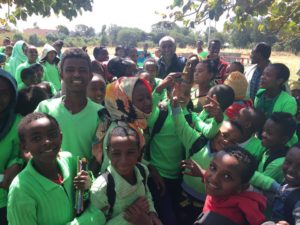
One our way to Debre Tabor University
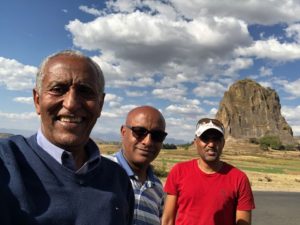
On our way back to Addis from Debre Birhan University
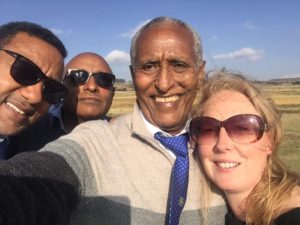
Debre Birhan University Group Photo
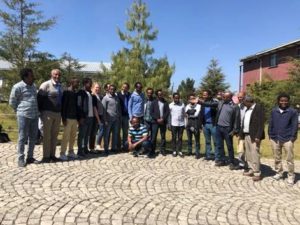
Group Photo- Debre Tabor University
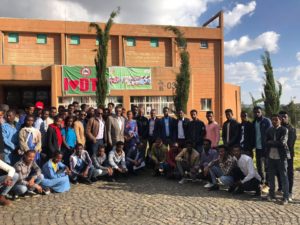
Poster session at Debre Tabor University
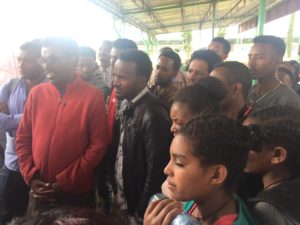
Plenary Session at Debre Tabor University
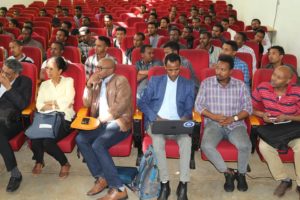
Group Photo at Kotebe Metropolitan University
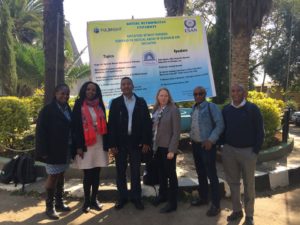
Workshop convened by Dr. Joseph Beyene at Debre Tabor University
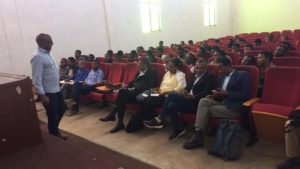
Dr Abebe Kebede and Dr. Yinges Yigzaw at BDU STEM Center
